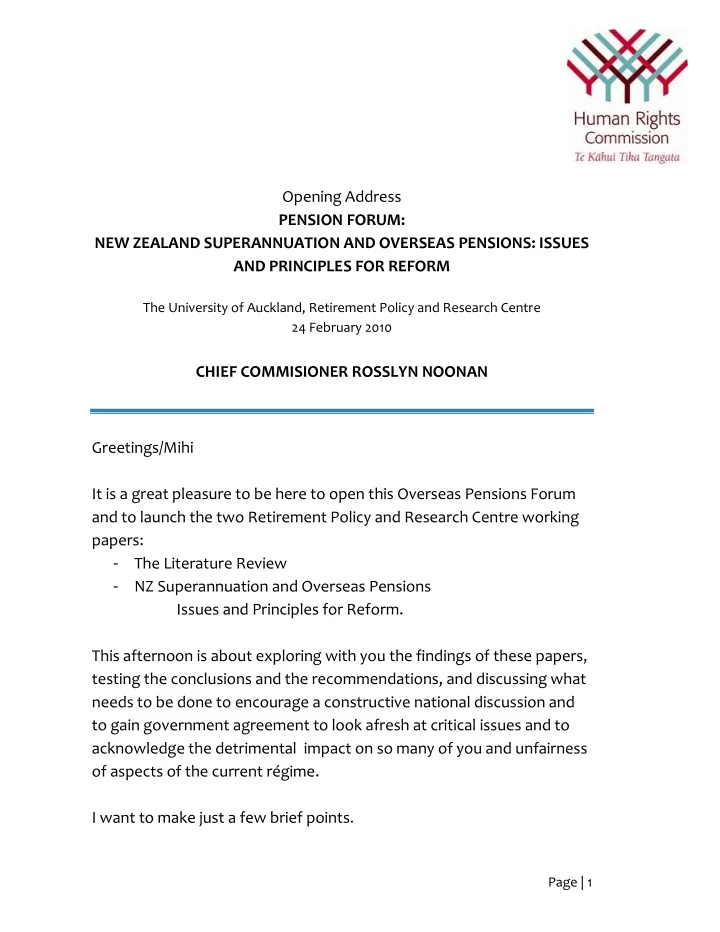

Opening Address PENSION FORUM: NEW ZEALAND SUPERANNUATION AND OVERSEAS PENSIONS: ISSUES AND PRINCIPLES FOR REFORM The University of Auckland, Retirement Policy and Research Centre 24 February 2010 CHIEF COMMISIONER ROSSLYN NOONAN Greetings/Mihi It is a great pleasure to be here to open this Overseas Pensions Forum and to launch the two Retirement Policy and Research Centre working papers: - The Literature Review - NZ Superannuation and Overseas Pensions Issues and Principles for Reform. This afternoon is about exploring with you the findings of these papers, testing the conclusions and the recommendations, and discussing what needs to be done to encourage a constructive national discussion and to gain government agreement to look afresh at critical issues and to acknowledge the detrimental impact on so many of you and unfairness of aspects of the current régime. I want to make just a few brief points. Page | 1
First, to record my appreciation and that of the Human Rights Commission for the quality of the work done by co-directors Susan St John and Michael Littlewood and Research Fellow Claire Dale and Research Assistant Annette Lazonby. They have made sense of an extraordinarily complex area. They have provided an invaluable and authoritative base from which to build fairer / more principled / more transparent / more efficient policy. They have provided us all with the tools essential to effective engagement with Government Ministers and their officials in the Treasury and the Ministry of Social Development. In the very complex world we live in, accessible social and economic analysis of the quality in these two papers is all too rare. Secondly, I want to acknowledge the contribution to the work of Sylvia Bell who is the Human Rights Commission’s Princi pal Legal and Policy Advisor. Sylvia’s meticulous legal analysis has enabled us to identify those few cases that can be progressed under the antidiscrimination provisions of the Human Rights Act. At the same time, she has actively explored ways of intervening in the policy process in relation to those cases that while certainly unfair do not legally constitute unlawful discrimination. Hence our partnership with the Auckland University Retirement Policy and Research Centre. Thirdly, I want to place this issue in the context of the right to an adequate standard of living. Poverty in old age is a feature of most OECD nations. In New Zealand, national superannuation has made a Page | 2
major contribution to eliminating the fear and reality of poverty in old age. Yet we are increasingly aware of, and indeed increasingly being lectured about, the importance of being able to supplement it from savings during our paid working lives - if we want to be able to live full lives and actively contribute to, and participate in our communities, in New Zealand society. Fourthly, large scale migration is a global reality today. Being globally mobile will be an increasing feature of the working lives of our children and grandchildren. So it is important that we don’t bequeath this problem to them. One of the great things about New Zealand is that it is a very open and accessible democracy. In a democratic society , as New Zealand’s history demonstrates, change is brought about by active citizens who identify an injustice, an unfairness, a breach of human rights, and work with others to build support to rectify it. The two Retirement Policy and Research Centre working papers: - The Literature Review and - NZ Superannuation and Overseas Pensions Issues and Principles for Reform provide a solid base from which to begin working for a more principled, transparent, fairer and more efficient approach to dealing with national superannuation and overseas pensions in this age of growing global migration and labour market mobility. I look forward to the outcomes of your discussions today. Page | 3
Recommend
More recommend